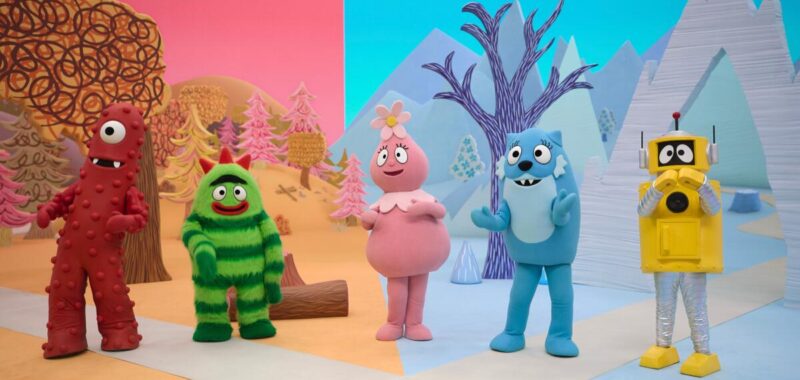In August 2007, an endless white space appeared on Nickelodeon’s Nick Jr., into which stepped a man wearing an orange track suit and a fuzzy orange hat. He carried a boom box, which turned out to be a carrying case containing five figurines, which the man — DJ Lance Rock (Lance Robertson) — placed in four dioramas spread out across a long table. With a bit of magic, the figurines — four monsters, Muno, Foofa, Brobee and Todee and a robot called Plex — came to life-sized life. And the party got started.
This was “Yo Gabba Gabba!,” which took its name from hip-hop and the Ramones. It was arguably the funkiest kids show in history; “Sesame Street” could be pretty funky, it’s true, but it never put Questlove, Bootsy Collins, Biz Markie, Mark Mothersbaugh and Erykah Badu onstage together. It achieved the usual markers of cultural penetration — the Macy’s Thanksgiving Day Parade, a traveling stage show, a Delta Airlines safety video, 57 varieties of merch — and an eight-year run.
Now the monsters are back, with a few new friends, in “Yo Gabba GabbaLand!,” an upgraded 10-episode series from Apple TV+. Once again, it’s the creation of Scott Schultz and Christian Jacobs, also known as M.C. Bat Commander of the neo-new wave/ska/punk/synth-pop superhero band the Aquabats! (He is the voice of Plex as well.) DJ Lance has been succeeded by Kammy Kam, 13-year-old Kamryn Smith, who, like Lance, dresses in orange and greets viewers with a cheerful “Hello, friends.”
The dioramas have been expanded into full-blown environments — spring meadow, summery desert, autumn forest, arctic winter — arranged in a hub like the lands of Disneyland, each connected to a monster that reflects its color scheme. The look of the show draws from a few decades of mid- to late-20th century design; practical stagecraft is abetted by digital effects, painted flats are arranged theatrically in a three-dimensional space. Visual and conceptual precedents, obvious to students or survivors of that era, include “The Banana Splits,” “H.R. Pufnstuf” and “Pee-Wee’s Playhouse.” (Even the original “Mickey Mouse Club,” from way back.) But it has a spirit quite its own.
The show is aimed at the pre-first grade demographic and includes a host of children being children. They dance, like little kids who have not yet progressed from thinking they can dance well to dancing well. They make funny faces. They are digitally inserted into dream tableaux — floating in a bed surrounded by giant rubber duckies, piloting a barrel with feet toward a parrot in a cowboy boot.
In a recurring segment, a child and a celebrity (Utkarsh Ambudkar, Gillian Jacobs, Sam Richardson, Chelsea Peretti, Flea, Diplo) collaborate on a story Mad Libs-style, with the child filling in the blanks. The resulting images — a cloud shaped like “an angry sandwich,” a bird making a home inside “a nice friendly bear” — would not have been out of place at the Cabaret Voltaire. A series of short films feature children from around the world showing what they eat for breakfast, where they live and how they play.
That doesn’t mean that adults won’t watch. You can get things from children’s programming that grown-up TV never thinks to give you. It’s colorful, absurd and stylistically bold. It creates its own logic. There is singing, dancing and, often, puppets. And where many children’s shows are crafted to satisfy an educational or psychological agenda — that is, they represent an adult point of view — “Yo Gabba GabbaLand!” comes from somewhere more purely … artistic. It’s like a metaphor for its own creation: Letting one’s imagination run wild is at once the point of the show and the thing that produced it.
An extension of playtime rather than a break from it, “Yo Gabba GabbaLand!” wants to rev things up. It’s a pre-pre-pre-teen dance party, with sounds provided by the Linda Lindas, dressed as shrimps; Portugal. The Man, with Paul Williams; Betty Who (as the Wind); Thundercat and his six-string bass; Big Daddy Kane and Reggie Watts bringing the “beat of the day” and Kurt Vile as King Silly, leading a “silly parade.” “Get silly/get silly/get silly/get silly” is a repeating refrain through the series. This might not be the best thing to show your kids right before bed.
To be sure, there are moments of relative repose. There are discussions among the monsters about feelings and how it’s OK to have them, even the sad and bad ones, along with some simple stratagems for dealing with them. Viewers are reminded, “You’re just the right size (color, shape) … exactly how you are.” Some passages one might almost call psychedelic if that word didn’t seem inappropriate to small fry. “I can feel the air, the air is warm.” “Look at the clouds, the clouds are moving through the air.” “Listen to the water/Sing with the water/Dance with the water.”
It always comes back to dancing.

